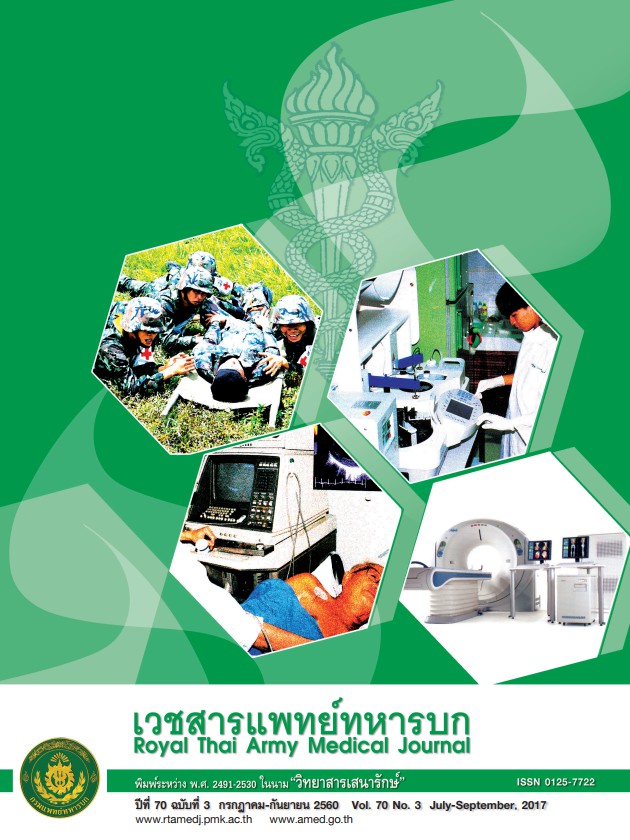การวินิจฉัยโรคทางเดินหายใจส่วนบนอุดกั้นระดับรุนแรง(Severe Obstructive Sleep Apnea - Severe OSA) และการประเมินประสิทธิภาพของเครื่องมือทันตกรรมประเภท Mandibular Advancement Splints - MAS ด้วยการตรวจการนอนหลับประเภทที่ 1(Polysomnography - PSG)และประเภทที่3
Main Article Content
บทคัดย่อ
การวินิจฉัยโรคทางเดินหายใจส่วนบนอุดกั้นระดับรุนแรง (Severe Obstructive Sleep Apnea - Severe OSA) และการประเมินประสิทธิภาพของเครื่องมือทันตกรรมประเภท Mandibular Advancement Splints - MAS ด้วยการตรวจการนอนหลับประเภทที่ 1 (Polysomnography - PSG) และ ประเภทที่ 3 (Modified Portable Sleep Apnea Testing Unattended)เนื่องจากขอจำกัดต่างๆ เช่น ค่าใช้จ่ายและ ระยะเวลารอคอยของการตรวจการนอนหลับประเภทที่ 1 Polysomnography-PSG ซึ่งมีความแม่นยำ และ เป็นมาตรฐานของการตรวจการนอนหลับที่ใช้ในการวินิจฉัยโรคทางเดินหายใจส่วนบนอุดกั้น จึงทำให้การตรวจการนอนหลับประเภทที่ 2, 3 และ 4 โดยการใช้ Portable monitoring เป็นอีกทางเลือกหนึ่งในการวินิจฉัยโรคทางเดินหายใจส่วนบนอุดกั้น อย่างไรก็ตามยังไม่มีความเห็นที่สอดคล้องกันในการใช้ Portable monitoring รายงานผู้ป่วยรายนี้แสดงถึงการตรวจการนอนหลับประเภทที่ 1 Polysomnography - PSG และ ประเภทที่ 3 Modified portable sleep apnea testingunattended ที่ใช้ในการวินิจฉัยและการติดตามผลกรรักษาในผู้ป่วยที่มีโรคทางเดินหายใจส่วนบนอุดกั้นระดับรุนแรงที่ได้รับการรักษาด้วยการใช้เครื่องมือทันตกรรมประเภท Mandibular advancement splint - MAS รายงานผู้ป่วยรายนี้แสดงให้เห็นว่า ความสำเร็จในการรักษา OSA ไม่ได้ขึ้นอยู่กับลักษณะทางกายวิภาคของทางเดินหายใจส่วนบนและการปรับตัวของผู้ป่วย และ ความสามารถของทันตแพทย์ในการเลือกใช้เครื่องมือและการพิจารณาปริมาณการยื่นขากรรไกรล่างที่เหมาะสมโดยคำนึงถึงผลข้างเคียงต่างๆ แต่ยังขึ้นอยู่กับความแม่นยำของ sleep study แต่ละประเภทที่ใช้การวินิจฉัยและประเมินผลการรักษา
The Use of Different Types of Sleep Study Type 1 (Polysomnography - PSG) and Type 3 (Modified Portable Sleep Apnea Testing Unattended) in Diagnosing the Obstructive Sleep Apnea (OSA) and Evaluating the Efficacy of Mandibular Advancement Splint (MAS)
The standard diagnostic technique in obstructive sleep apnea (OSA) is based on type 1 sleep study (polysomnography - PSG) but the cost and complexity limitation of type1 sleep study have led to the utilization of type 2, 3, 4 sleep study (portable monitoring). However, the use of portable monitoring to assess patients suspected of having sleep apnea is controvercial. The aim of this case report is to demonstrate the results of
different types of sleep study (Type 1 PSG and Type 3 modified portable sleep apnea testing unattended) used in diagnosing the obstructive sleep apnea (OSA) and evaluating the efficacy of mandibular advancement splint (MAS) in patient who was diagnosed with severe obstructive sleep apnea (OSA) and unable to comply with continuous positive airway pressure (CPAP). This case report may suggest that the efficacy of obstructive sleep
apnea (OSA) treatment by means of using the mandibular advancement splint is the results of several factors including the accuracy of the sleep study
Downloads
Article Details
บทความในวารสารนี้อยู่ภายใต้ลิขสิทธิ์ของ กรมแพทย์ทหารบก และเผยแพร่ภายใต้สัญญาอนุญาต Creative Commons Attribution-NonCommercial-NoDerivatives 4.0 International (CC BY-NC-ND 4.0)
ท่านสามารถอ่านและใช้งานเพื่อวัตถุประสงค์ทางการศึกษา และทางวิชาการ เช่น การสอน การวิจัย หรือการอ้างอิง โดยต้องให้เครดิตอย่างเหมาะสมแก่ผู้เขียนและวารสาร
ห้ามใช้หรือแก้ไขบทความโดยไม่ได้รับอนุญาต
ข้อความที่ปรากฏในบทความเป็นความคิดเห็นของผู้เขียนเท่านั้น
ผู้เขียนเป็นผู้รับผิดชอบต่อเนื้อหาและความถูกต้องของบทความของตนอย่างเต็มที่
การนำบทความไปเผยแพร่ซ้ำในรูปแบบสาธารณะอื่นใด ต้องได้รับอนุญาตจากวารสาร


